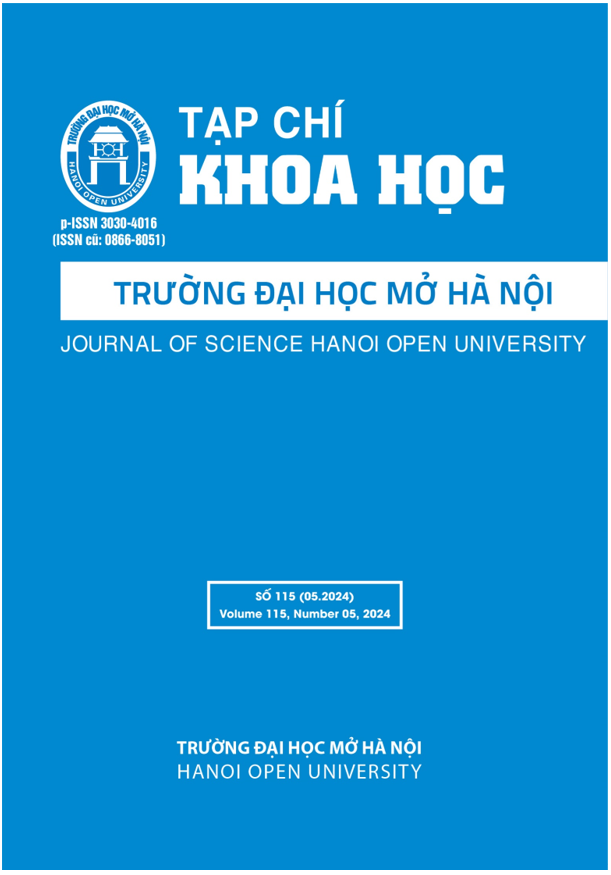ÁP DỤNG PHƯƠNG PHÁP TRANH LUẬN ĐỂ PHÁT TRIỂN NĂNG LỰC GIAO TIẾP TIẾNG ANH VÀ TƯ DUY PHẢN BIỆN CHO SINH VIÊN ĐẠI HỌC
DOI:
https://doi.org/10.59266/houjs.2024.401Keywords:
kỹ năng giao tiếp, nói tiếng Anh, phương pháp sư phạm, tranh luận, tư duy phản biệnAbstract
Đối với những sinh viên đại học vẫn còn thói quen nói tiếng Anh theo kiểu học thuộc lòng thì các em sẽ ít có cơ hội để phát triển kỹ năng giao tiếp; vì vậy, việc áp dụng các cuộc tranh luận trong lớp học có thể giúp các em học được cách giao tiếp và tư duy phản biện. Trong một khóa học kéo dài 4 tuần tại Trường đại học Công nghệ Đồng Nai, tác giả đã áp dụng phương pháp tranh luận tiếng Anh trong một lớp học được tổ chức theo yêu cầu và điều tra xem 24 sinh viên phản ứng như thế nào với việc học tiếng Anh thông qua phương pháp này. Nghiên cứu sử dụng phương pháp phỏng vấn và quan sát để xem tranh luận tác động như thế nào lên thái độ học tiếng Anh, khả năng nói tiếng Anh và tư duy phản biện của sinh viên. Kết quả cho thấy hầu hết người tham gia đều phản ứng tích cực với các buổi học. Nghiên cứu này cũng góp phần nâng cao nhận thức về những lợi ích mà hoạt động tranh luận mang lại trong việc hoàn thiện phương pháp sư phạm của nhà trường.
References
[1]. Altakhaineh, A. R. M., Al-Tkhayneh, K. M., & Rahrouh, H. N. (2019). The effect of the genderand culture of the IELTS examiner on the examinees’ performance on the IELTS speaking test in the UAE context. International Journal of Arabic-English Studies, 19(1), 33-49. doi:10.33806/ ijaes2000.19.1.2
[2]. Doody, O., & Condon, M.V. (2012). Increasing student involvement and learning through using debate as an assessment. Nurse education in practice, 12(4), 232-237.
[3]. Douglas, M. C. (2014). Using debates to enhance students’ oral business communication skills. International Journal of Business and Social Science, 5(10), 1-8.
[4]. Iman, J. (2017). Debate Instruction in EFL Classroom: Impacts on the Critical Thinking and Speaking Skill. International Journal of Instruction, 10(4), 87-108.
[5]. Hoang,V.V. (2013).The current situation and issues of the teaching of English in Vietnam. Retrieved from http://r-cube. ritsumei.ac.jp/bitstream/10367/4129/1/ LCS_22_1pp7-18_HOANG.pdf.
[6]. Kota Jodoi, 2023, The correlations between Parliamentary debate participation, communication, Competence, Communication Apprehension, Argumentativeness, and Willingness to Communicate in a Japanese context, Argumentation 37, no. 1, 91-118.
[7]. Malmir, A., & Shoorcheh, S. (2012). An investigation of the impact of teaching critical thinking on the Iranian EFL learners’ speaking skill. Journal [11]. Tran, T. M. (2023). Integrating of Language Teaching and Research, 21st Century Skills into Translation 3(4), 608-617. doi:10.4304/jltr.3.4.608- Classroom from Students’ Perspective. 617 International Journal of TESOL &
[8]. Phuong, H. Y. (2016). Challenges Education, 3(1), 64-78. https://doi.of shifting to Task-based language org/10.54855/ijte.23315 teaching: A story from a Vietnamese [12]. Yusuf, F. A., & Adeoye, E. A. (2012). teacher. Can Tho University Journal of Developing critical thinking and Science, 2, 37-45. communication skills in students:
[9]. Pradana, S. (2017). Using Debate to Implications for practice in education. Enhance Students’ Speaking Ability African Research Review, 6(1), 311-as their Character Building. English 324. doi:10.4314/afrrev.v6i1.26. Education: Jurnal Tadris Bahasa Inggris, 10(11), 149-163. [13]. Zare, P., & Othman, M. (2013). Classroom Debate as a Systematic
[10]. Tianame, M., Usman, B., & Muslem, Teaching/Learning Approach. World A. (2019). The Implementation of Applied Sciences Journal, 28(11), Debate Technigue to Enhance Students’ 1506-1513.
